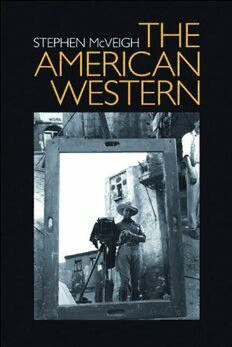
The American Western PDF
249 Pages·2007·1.205 MB·English
Most books are stored in the elastic cloud where traffic is expensive. For this reason, we have a limit on daily download.
Preview The American Western
Description:
This wide-ranging book illuminates the importance of the Western in American history. It explores the interconnections between the Western in both literature and film and the United States in the 20th century. Structured chronologically, the book traces the evolution of the Western as a uniquely American form. The author argues that America's frontier past was quickly transformed into a set of symbols and myths, an American meta-narrative that came to underpin much of the 'American century'. He details how and why this process occurred, the form and function of Western myths and symbols, the evolution of this mythology, and its subversions and reconstructions throughout 20th-century American history. The book engages with the full range of historical, literary and cinematic perspectives and texts, from the founding Western histories of Theodore Roosevelt and Frederick Jackson Turner to the New Western history of Patricia Nelson Limerick and Richard White. Key texts used to illustrate the narrative include: Owen Wister's The VirginianJack Schaefer's ShaneCormac McCarthy's Blood MeridianIshmael Reed's Yellow Back Radio Broke DownFilms from Edwin Porter's The Great Train Robbery to Fred Zinneman's High Noon and from Clint Eastwood's Unforgiven to the post 9/11 Westerns Open Range, The Alamo and Brokeback MountainThis book is an essential and comprehensive analysis of the significance and enduring legacy of the American Western. Key Features: Includes chapters on Western history, literature and filmShows the interconnections between the Western (in all its forms) and 20th-century American history, politics, culture and societyThe only book to take a multi-disciplinary approach to the subject (4/1/08)
See more
The list of books you might like
Most books are stored in the elastic cloud where traffic is expensive. For this reason, we have a limit on daily download.
